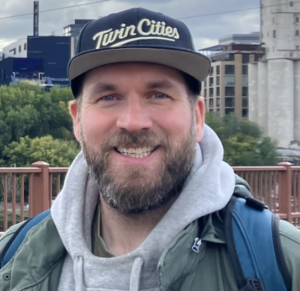Content Warning: Trauma is alluded to in this devotion. Specific details are not given in an effort to avoid retraumatization.
After being sober and stable for five years, one event triggered a domino effect of suppressed emotions. I was working as support staff at an addiction treatment center. Late one evening, I was the sole witness of a traumatic event involving a client. Once the EMTs and the medical team addressed the needs of the patient and took them to the hospital, my shift was over. The next day, the clinical director suggested that I reach out to the Employee Assistance Program for counseling. I had an appointment within 48 hours.
Upon arrival, I expected that I would be speaking with the counselor specifically about the incident at work. I soon realized that I had a bigger problem lurking beneath the surface. About five minutes into the session, the therapist made an observation: “You appear to be holding back some anger.” She was right on the money. I had been angry for years, and I hadn’t told anyone.
What was the source of my anger?
Here are some contributing factors. When I was hired at the treatment center in 2012, staff would receive news of a fatal opioid overdose of a former client about once a month. When a former patient died their admission photo would be placed on the coffee table in the staff room. Suddenly, there was a spike in opioid-related deaths. Between 2013 and 2015, the pervasiveness and lethality of fentanyl took me by surprise. One month, I remember five opioid-related deaths happening in succession. At one point the coffee table had three photos on it. I had done nothing to consider the impact of this level of grief.
As the therapist dug deeper, there had also been a few untimely deaths in my family and in my friend group. I had attended more funerals in a year than most 35-year-olds do. My therapist asked if there was anything that I had done to manage my grief. The answer was, “Not much.”
She got me to describe how I felt at a funeral. “Furious,” I said. I had recently sat in the front row of a funeral and watched a slideshow that I had made. I was fuming, with pent-up rage beneath the surface. Listening to the pastor and other friends of the deceased talk at the funeral made my blood boil. Working with the counselor helped me realize this suppressed anger was not sustainable.
Through counseling, I discovered how grief was the great amplifier. I had no natural skills to deal with the emotions that accompanied death. Unprocessed emotions, left to pile up and fester, only intensify. When remorse, sadness, shock, fear, disappointment, and a host of other emotions inevitably accompany grief, I will always get overwhelmed. All of my tangled emotions will collapse under the weight of compounded grief, and my response has always been anger.
When I simmered with anger at numerous funerals, I projected my anger at the deceased. Remaining angry at the dead was not a healthy emotional or spiritual place to inhabit. I must always remember that if I don’t take grief seriously, an emotional and spiritual blight will spread throughout my entire life. It only takes one unrelated incident, like the traumatic event with the client, to unlock the suppressed grief. Through my experience, I know that swift and comprehensive counseling and support are necessary responses to death.
Working with a counselor is when I learned that I should take the effects of any death in my proximity seriously. It doesn’t matter if I knew them for a short period of time or my whole life; if not dealt with, grief will take an accumulative effect on my mental, physical, emotional, and behavioral health.
More than eight years ago, a patient at the treatment center initiated my journey to address my unhealthy relationship with grief. Since then, significant changes have occurred in my approach to dealing with death. I still want to surpress my emotions when faced with grief. When I feel this unhealthy reflex kick in, I know it is time to reach outside of my comfort zone and talk. When grief begins to amplify my emotions, I have a comprehensive support network to contact. I have my doctor, counselor, 12-step sponsor, 12-step support group members, faith community, family, spouse, employee assistance program, and God to rely on. If I face grief alone, I have proven to myself that anger will envelop my existence.
I still experience grief today. The biggest change is that grief isn’t a burden. Grief doesn’t run my emotions in the background. Acknowledging the existence of grief has been the biggest change. My awareness of grief means that death doesn’t amplify my emotions to a state of unmanageability. Death will always stir up my emotions but with awareness, support, faith, and humility, grief has become a more intentional process.
Thank you and Amen.
A PRAYER: To the Divine force that governs the living and the dying, show us the path to reconcile all forms of grief.


4 Responses
Thank you for this. Grief is complicated, persistent, but, as you have found, manageable.
Thank you for your response! Your insight into the challenge of learning to manage grief is deeply appreciated. Indeed, the journey towards finding manageability in the midst of grief can be a painful and often arduous one. Thank you for taking the time to share your thoughts.
Grief is not easy. It’s is confusing full of ups and downs . @@and it ‘s definitely not the same for everyone.
For me I have had counseling to help deal with e.g. when my son was killed in an accident and my step son died of cancer…loosing a child is very difficult…I have lost a lot of people in my life and I am so grateful for the help I have received …each death is different I am great full for my spiritual and I fine talking about it has helped me and I share with others who have gone through grief . As anger is depression turned inside out and it is important for me to be able to talk about my grief with people who understand I find photos help me and talking positive of my loved ones there is so much to deal with a loss especially of a child.
Thank you, Ellie, for your thoughtful response. It’s clear that you have a deep understanding of grief. I can’t even fathom the pain of losing a child. Your willingness to share your coping strategies is truly valuable. From my own experiences, I agree that everything you mentioned is essential for processing grief in a healthy manner. I’m grateful that you took the time to read today’s article.
-God Bless!